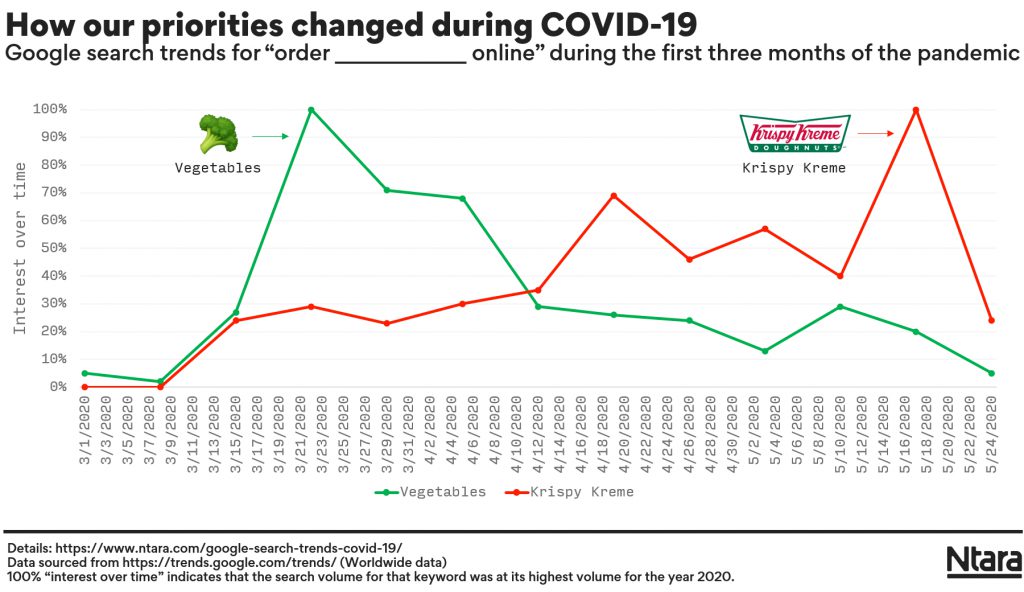Google Search Trends can be fascinating. We’re more open on Google than we are anywhere else.
We’ve typed things into Google that we wouldn’t confide in our closest friends. Fears, vulnerabilities, needs, desires—almost every thought we have, we put into a search bar, hoping for an answer.
It’s a window into the human experience, and this has been a year that has pushed the human experience more than we ever imagined possible.
We dug into our year of Google searches to see how our online shopping habits changed during the COVID-19 pandemic. But what we found didn’t just give us insights into online ordering and e-commerce; it shined a light on the human experience during a year unlike any before.
Join us as we take a different kind of look at how we responded to a tragedy that changed the world.
The “Wuhan Virus” scare
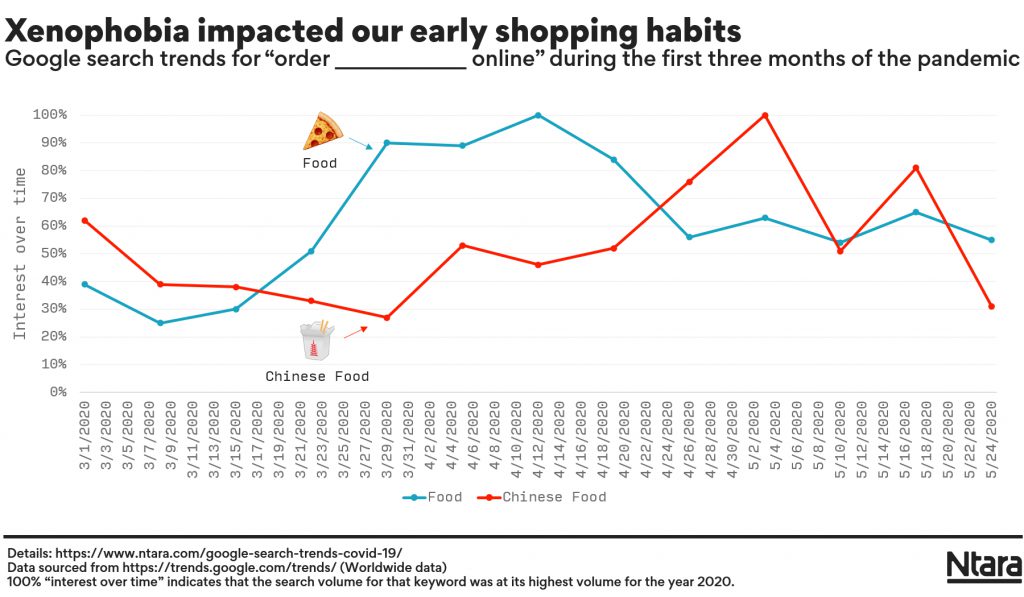
When the first COVID-19 cases trickled into the United States of America, nobody knew quite what to call it. The words “Wuhan Virus” and “China Virus” slipped off many tongues—words that experts worried would create anti-Chinese stigmas.
They may have been right.
When the first lockdowns started in the United States, Americans turned to delivery services like Doordash and Uber Eats for pizza, fast food, fine dining, and almost any kind of food you can think of—except for one: Chinese food. Once ubiquitous in the take-out food industry, this was the one type of food that just didn’t come to mind when Americans started ordering delivery. Searches plummeted during March, and the livelihoods of the nearly 500,000 people working in the industry were put in jeopardy.
Every restaurant struggled during COVID-19, but Chinese restaurants were particularly hard hit, with some restaurants reporting as great as 90% drops in revenue in March 2020.
The great toilet paper shortage of 2020
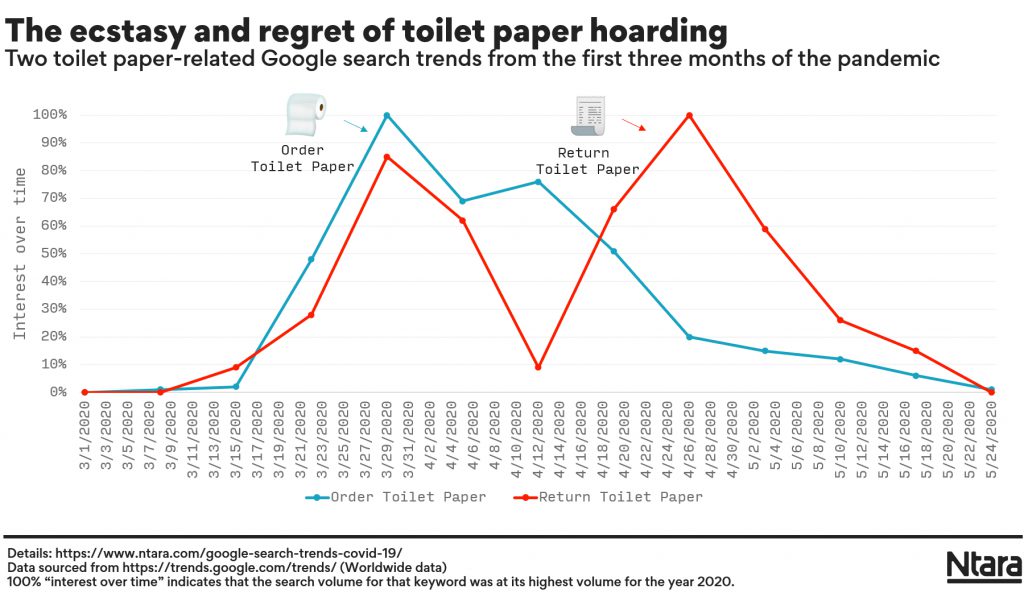
In the first month of March, it seemed like the world was ending. Store shelves were being cleaned out, and, across the country, people desperately struggled to find sanitizer, face masks, and—above all—toilet paper.
People started hoarding. And while we like to think of it as a few bad apples, it seems like an awful lot of us did it. According to Google’s Keyword Planner Tool, more than 477,000 Americans typed the words “bulk toilet paper” or “wholesale toilet paper” into Google in March alone.
As it turns out, we didn’t need quite that much. When the chaos settled in April, searches for “return toilet paper” hit an all-time high.
America learns to cook (and then gives up)
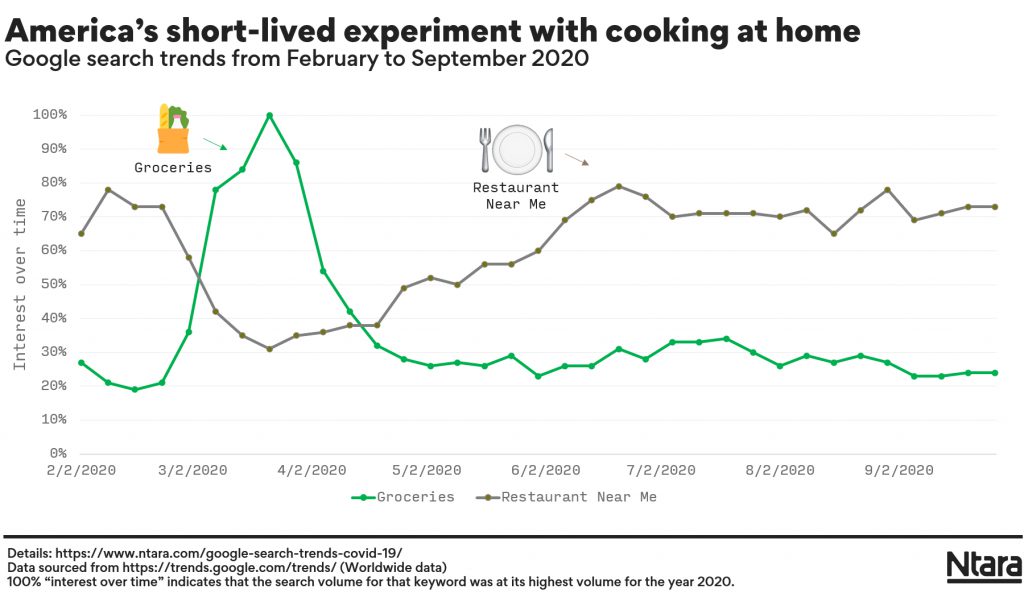
There are some things we would rather risk death than do.
That’s one thing I learned about myself during COVID-19. When the lockdowns started, I tried to follow every CDC guideline imaginable. We cooked everything at home, and we entered those grocery stores with masks on and hand sanitizer ready, and we sprayed every inch of everything we bought with disinfectant.
As it turns out, given the choice between going through that hassle and potentially dying of COVID, I’m willing to take my chances – and so are most Americans, according to the Google Search Trends data.
We pulled off about one month of buying our groceries before many gave up and started looking for restaurants in our area again.
How we settled into life in lockdown
This is one of my favorite little data points in 2020’s Google Search Trends. When the pandemic started, searches for ways to order vegetables online skyrockets. But it didn’t take long for them to go back to normal—and for searches for Krispy Kreme to skyrocket.
This might be a bit of spurious correlation, but it holds up for a lot of different search terms. Everything healthy and essential to our survival, such as vegetables, rice, and flour, all saw massive searches in March. And all of those essentials started to taper off and go back to normal in April, while other searches, such as Krispy Kreme or KFC, started to climb to all-time highs.
It makes sense, really. When the COVID-19 lockdowns began, people around the world went into survival mode. The pandemic had started in a food market, and so a good number of us weren’t too comfortable walking through a grocery store with a disease spreading through the world. People didn’t know what they were getting to or how bad it was going to be.
But once we started to settle into life in lockdown in April and May, we started looking for safe ways to relax—like a quick Google search to see if Krispy Kreme delivers.
Staying safe during COVID-19
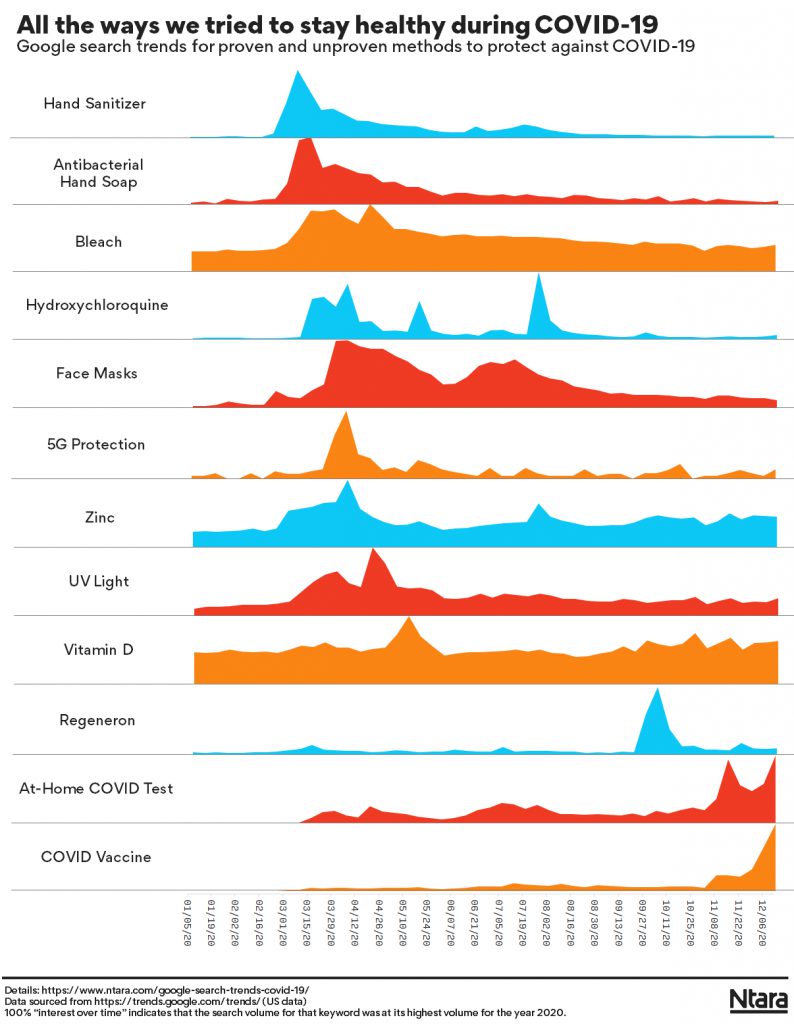
As COVID-19 spread through our communities, Americans, desperate to stay healthy, tried everything the experts recommended—and a few things they didn’t.
The Google Search Trends data is almost like a portrait of our growing panic. In March, we generally did our best to follow the instructions, purchasing hand sanitizer, disinfectants, and eventually face masks. But as April rolled in and the cases continued to mount, Americans started turning to more and more desperate measures, like buying gadgets that claimed to protect us from 5G radiation.
Still, the Google Search Trends data suggests that we put a lot more faith in our government than we’re given credit for.
We listened to the CDC when they discouraged us from wearing face masks in March. And in April, when they changed their minds, we listened again.
And after the president made comments that some believed implied that injecting bleach could treat COVID-19, an extra 1,570 Americans typed the words “buy bleach” into Google. And according to Time, poisoning reports went up 121%.
But as the year dragged on, Americans seem to have tired of miracle cures and shocking tricks their doctors didn’t want them to know. Today, our attention has shifted to light at the end of our tunnel: the COVID-19 vaccine.
The new hobbies that did (and didn’t) stick
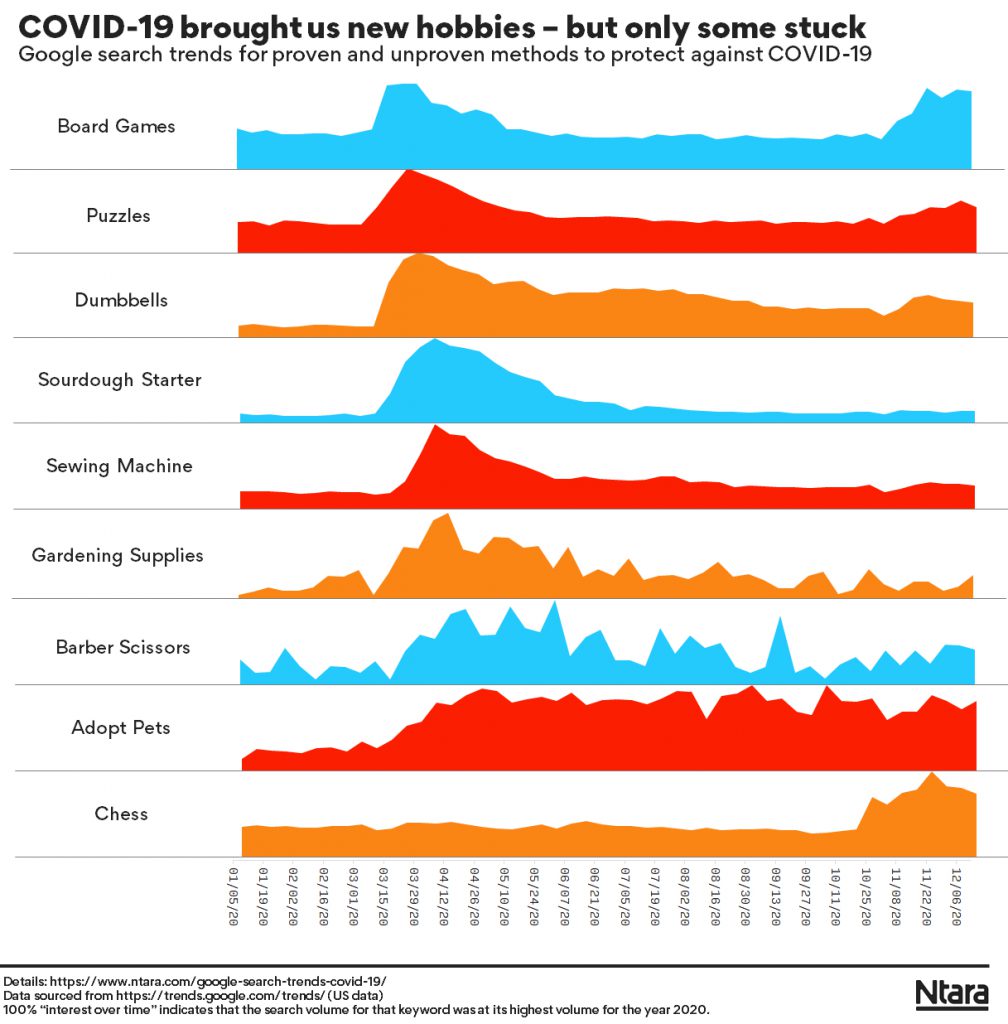
COVID-19 forced us to try a lot of new things. Locked inside of our homes for longer than ever before, people around the world started looking up new ways to pass the time. Google Search Trends suggest that some of the ideas we found might change our habits forever.
At the beginning of the pandemic, most of us turned to the obvious ideas for indoor fun: board games, puzzles, and exercise. But as time passed, we started getting more productive. People started learning to cook, to sew, to garden, and to cut their own hair.
Some of those ideas don’t really seem to have stuck—especially things we can pay to have other people do for us, like cook and sew. But Americans seem to have taken on the types of self-improvement that can’t be bought for good.
Americans are still looking up exercise equipment, such as dumbbells, at three times the rate they did before the pandemic started, and that’s translated to real purchases. Nautilus, the fitness equipment manufacturers behind Bowflex, posted a 152% year-over-year increase in revenue in the third quarter of 2020.
Americans have kept gardening, too. The garden equipment industry grew more than other industry in 2020, and Lowes, so far, has brought in 24% more revenue in 2020 than they did in 2019.
Zoom, of course, was the big winner of 2020. In the third quarter of 2020, the company saw a 367% year-over-year increase in revenue. But Americans have generally been moving to small, digital sellers. Both Etsy and Shopify’s Merchant Solutions saw their revenue more than double in 2020 and, according to Google Search Trends data, interest in the companies has only grown as the year has gone on.
We’re coming to the end of an incredible and unusual year—but we won’t come out of it the same. We’re a little wiser, a little more experienced, and a little more focused on making ourselves and the world around us better.
